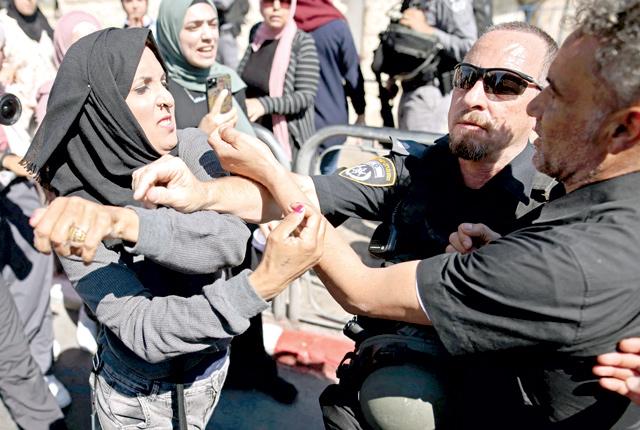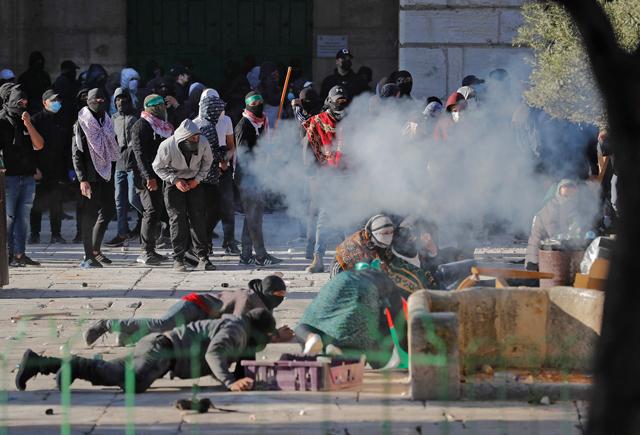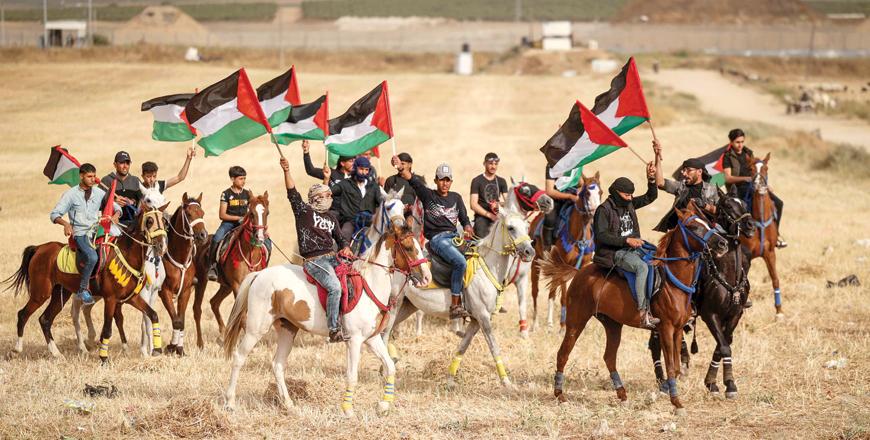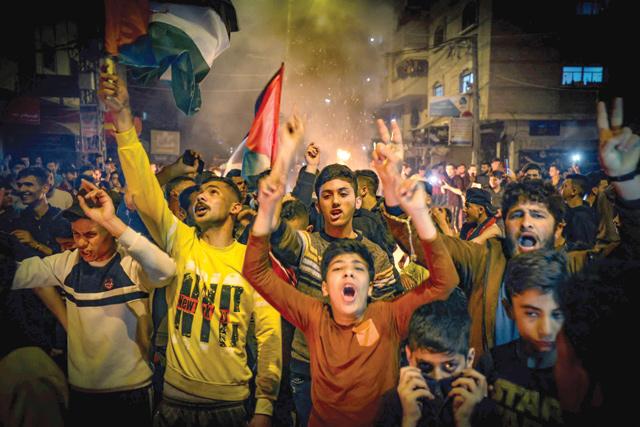You are here
Far-right Jerusalem march tests new Israeli government
By AFP - Jun 16,2021 - Last updated at Jun 16,2021

A Palestinian woman confronts Israeli forces outside the Damascus gate in East Jerusalem, on Tuesday, ahead of the March of the Flags which celebrates the anniversary of Israel's 1967 occupation of the city's eastern sector (AFP photo)
OCCUPIED JERUSALEM — Israeli forces blocked roads in Jerusalem on Tuesday as Jewish ultranationalists prepared to march through the city's occupied east, inflaming tensions amid a fragile Gaza ceasefire and just two days after a new Israeli government took office.
Rallies by far-right Jewish groups in Arab neighbourhoods have raised tensions in recent months, prompting a police intervention in Al Aqsa Mosque Compound last month that triggered the deadliest flare-up of Israeli-Palestinian violence since 2014.
The so-called March of the Flags celebrates the anniversary of the so-called Jerusalem's "re-unification" after Israel occupied the city in the June War of 1967.
The demonstration was originally scheduled for early May, but organisers cancelled it after police redirected the route to avoid Damascus Gate, a key entrance for Arab residents of East Jerusalem.
A new march was set for last Thursday but was delayed due to Israeli forces opposition to the route and warnings from Gaza's Islamist rulers Hamas.
The government of outgoing premier Benjamin Netanyahu last week delayed the march until Tuesday, a time confirmed late Monday by the incoming government of Prime Minister Naftali Bennett.
The government said organisers had consulted police on the best route for the march, scheduled to begin at 1430 GMT.
It was planned to halt at Damascus Gate but not enter the Old City there, taking another route that avoids the Muslim Quarter before arriving at the Wailing Wall, a holy site for Jews.
"The right to demonstrate is a right in all democracies," said the newly sworn-in Internal Security Minister Omer Bar-Lev.
"The police is ready and we will do everything in our power to preserve the delicate thread of coexistence."
Palestinian Prime Minister Mohammad Shtayyeh condemned it as a provocation, while an alliance of Palestinian armed groups including Hamas called for a “day of rage” to defend Jerusalem.
“We warn of the dangerous repercussions that may result from the occupying power’s intention to allow extremist Israeli settlers to carry out the Flag March in occupied Jerusalem tomorrow,” Shtayyeh tweeted in English on Monday.
He said it was “a provocation and aggression against our people, Jerusalem and its sanctities that must end”.
By Tuesday afternoon, militants in Gaza had sent incendiary balloons over the border, with Israeli public radio reporting 15 fires in the Negev desert as a result.
Islamic Jihad activist Abu Hudhayfa said the balloons were aimed “to warn the occupation against harming the Al Aqsa Mosque or launching its march towards Al Aqsa Mosque.”
The new Israeli premier is himself a Jewish nationalist but the coalition he leads also includes centrist and left-wing parties and, for the first time in the country’s history, an Arab party.
The support of the four lawmakers of the Islamic conservative Raam Party was vital to the wafer-thin majority that the government won in a historic confidence vote that unseated Netanyahu on Sunday.
‘Very fragile’
UN Middle East peace envoy Tor Wennesland urged all sides to behave responsibly to avoid damage to a hard-won May 21 ceasefire that ended 11 days of heavy fighting in and around Gaza.
“Tensions are rising again in Jerusalem at a very fragile & sensitive security & political time, when UN & Egypt are actively engaged in solidifying the ceasefire,” Wennesland said, urging all parties “to act responsibly and avoid any provocations”.
The US embassy told its staff to avoid entering the walled Old City in the heart of occupied East Jerusalem because of the march and “possible counterdemonstrations”.
Israel’s annexation of east Jerusalem since the Six-Day War of 1967 is not recognised by most of the international community which says the city’s final status should be a matter of negotiation between the two sides.
The Palestinians claim the city’s east as the capital of their future state.
The iconic Al Aqsa Mosque Compound in the heart of the Old City is Islam’s third holiest site and a national symbol for all Palestinians regardless of religion.
It is also Judaism’s holiest site, although by longstanding convention Jews are not allowed to pray inside the compound. Visits by Israeli Jewish politicians often trigger violence.
Hamas warning
When the march was originally announced for last week, senior Hamas official Khalil Hayya warned it could spark a return to violence like that of May 10-21.
Hamas spokesman Mohammed Hamadeh said Tuesday that mediators had been in contact with Palestinian armed groups in recent days to appeal to them “not to engage in a military escalation on the basis of the march.”
“All options remain on the table, however,” the spokesman added.
Last month’s conflict started after Hamas issued a deadline for Israel to remove its security forces from flashpoint areas of occupied East Jerusalem, and then fired a salvo of rockets at Israel when the ultimatum went unheeded.
Israeli strikes on the Gaza Strip between May 10 and 21 killed 260 Palestinians including some fighters, the Gaza authorities said.
Related Articles
OCCUPIED JERUSALEM — More than 150 people were wounded on Friday in confrontations with Palestinian demonstrators and Israeli forces in Jeru
GAZA CITY, Palestine — Hamas leader Ismail Haniyeh warned on Sunday against a planned march by Jewish nationalists through Israeli-occupied
OCCUPIED JERUSALEM — Israeli warplanes struck the Gaza Strip early Saturday after repeated salvos of rocket fire into Israel followed a seco

















